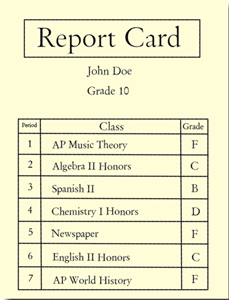By THOMAS EGAN
 There comes a time at the end of each quarter when a student’s fourth period teacher passes out report cards. For some of these students, this can be an unpleasant experience.
There comes a time at the end of each quarter when a student’s fourth period teacher passes out report cards. For some of these students, this can be an unpleasant experience.
They have drifted through the quarter without a thought as to how all their procrastination and slacking off will affect their GPA and academic future. During the quarter, the students hung out, went out with friends and forgot about their responsibilities. These students have become complacent, and it is the job of their parents to get them back on track before it is too late.
The parent-child relationship is the most important one a child has, much more important than the teacher-child relationship or even the child’s relationship with his friends. That is why parents have such an important influence on a child’s academic and adult life.
High school is a major factor in deciding who and what a child will become in his future, but childhood defines who that child will be in high school, and the parents are a child’s first role models. Teachers do not have an influence until a teenager starts high school, and even then, each teacher only sees a child for 49 minutes a day, five days a week.
When a child comes home, how he spends his day is crucial to his success in school. Whether he studies or not is primarily up to the parents, who can control and limit how much time a child spends sleeping, studying or relaxing.
According to studies by the New York University Child Study Center, the children of more involved parents are more well-behaved, do better academically, go to better schools and go further in the schools they attend.
These studies also show that a home environment that encourages learning is more important to a child’s success than parents’ income, education level or cultural background.
To provide this essential learning environment, parents should talk to their children about what is going on in school and check homework every night. Parents should also try their best to limit television watching and time spent on the Internet and social networking sites.
In a November 2010 survey of 500 teachers done by school trip providers JCA, who motivate personal and social development outside the classroom, 50 percent blamed social networking for low concentration in class and 73 percent believed that parents should take responsibility and limit a child’s time online.
Teachers cannot come to the student’s house every afternoon and make them focus. When students are falling behind in school or losing focus, the parents are responsible for picking them back up and pushing them forward so that the child can succeed in life.
High school is the time in an adolescent’s life where he must become independent and separate from his parents, but that does not mean that the parents should leave him to pass or fail on his own. Parents should extend a guiding hand to keep their child on the right path and stay active and present in case the child needs somebody to come to with problems.
If a child is falling behind in school, parents should help the child improve in any areas that he is lacking. The NYU Child Study Center identified that organization, planning and deadlines are three key areas in school. Parents should sit down with the child and discuss how to improve in these areas.
A child never outgrows his parents. Even as adults, parents still have a full life of experience and wisdom to offer their children. Adolescence is hard for everybody, but parents can help make it easier by being there for their children and being involved in their lives.